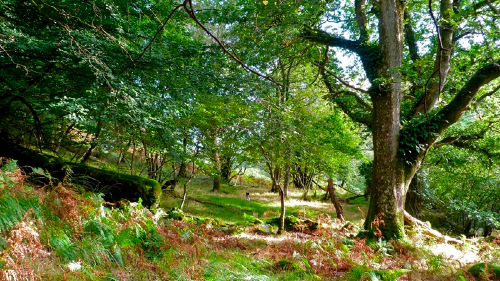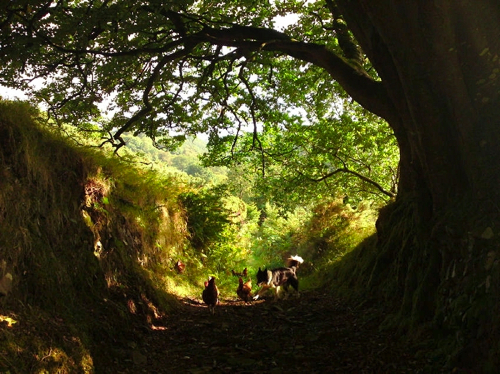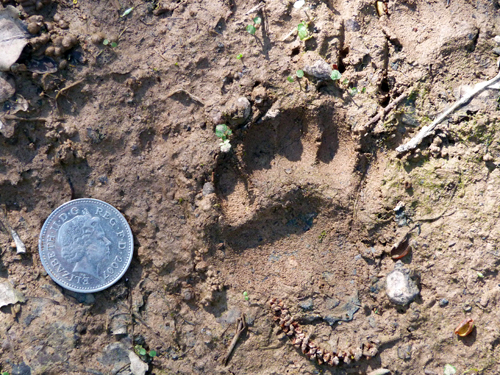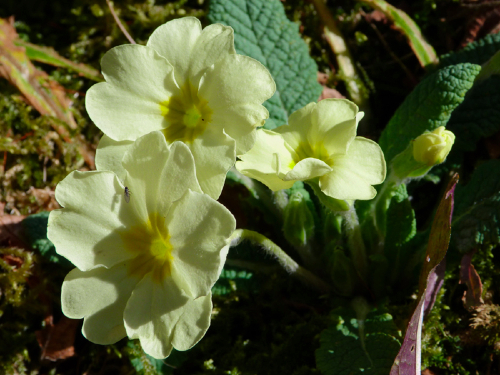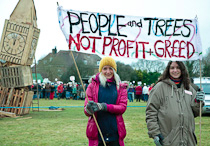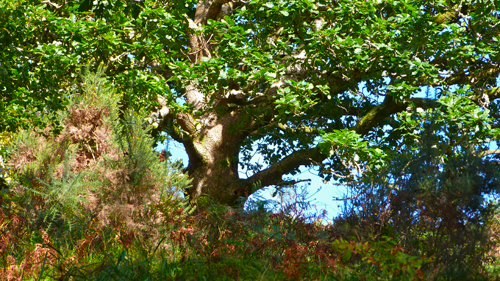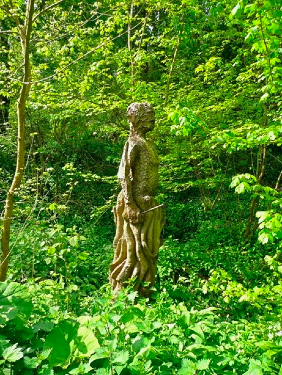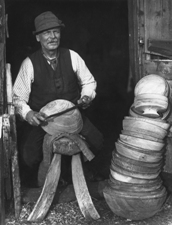Background Briefing for Our Forests FOI requests
What was and is the stance of the conservation bodies represented on the Independent Panel on Forestry re:
- the Government’s proposals to ‘dispose’ of the public forest estate;
- Public ownership?
“I am, of course, listening to all the arguments that are being put on this matter. However, I ask whether there are organisations, such as the Woodland Trust and the National Trust, that could do a better job than the Forestry Commission. I believe that there are.”[1]
– David Cameron, responding to a question in the House of Commons re: disposal proposals, February 2nd, 2011
Since it first became public knowledge that the Government was intending ‘disposing’ of the entire public forest estate as managed currently by the Forestry Commission, there has been a lack of clarity and apparent inconsistency as to where the conservation bodies stood and stand on the ‘disposal proposal’ and the related issue of public ownership. None of the main conservation or environment organisations appeared to oppose unequivocally the disposal plans – referring instead to a set of principles which any transfer of land should meet.[2]
Although 84% of people polled by YouGov[3] in January 2011 said that our woods and forests should be kept in public ownership for future generations, the latter was not one of the key principles put forward by the conservation bodies. As Sue Holden, Chief Executive of the Woodland Trust, stated in a recent interview in Walk magazine,
“We want to see enhanced protection, we don’t want to get involved in the political debate about ownership. In the end, I don’t think ownership is the critical factor on whether woods are enjoyed or well managed. For me, the resources available for improving access and designation is the big issue.”[4]
Nor did any of the main conservation bodies appear in the vanguard of challenging the Public Bodies Bill, which would have given the Government the power to radically reform the Forestry Commission and dispose of the woods and forests that make up the public forest estate, without further recourse to Parliament or the public. [5] Twelve access and recreation organisations led by The Ramblers – and including the Woodland Trust – did eventually oppose the Public Bodies Bill in a joint letter dated 4th February 2011.[6] However, grassroots groups, such as HOOF, Save Our Woods and 38 Degrees had recognised the critical threat posed to our public woods and forests by the Bill at the outset and had opposed it from its introduction in Parliament in October 2010. In the face of widespread public opposition, with over half a million signing the 38 Degrees ‘Save Our Forests’ petition, and even its own back-bench MPs in revolt against its plans, the Government announced it would halt the disposal proposals on 17th February; withdrawing the clauses in the Public Bodies Bill relating to the Forestry Commission at the same time.
Notwithstanding their later statements to the contrary, it was rumoured, as well as being reported in the media, that some of the main conservation NGOs with landowning interests had been in discussions with Government officials or were considering taking on the ownership and management of some of the public woods and forests proposed for disposal:
‘A spokesman for the National Trust said: “Potentially this is an opportunity. It would depend on which 50 per cent of land they sold off, if it is valuable in terms of nature, conservation and landscape, or of high commercial value in terms of logging. We will take a fairly pragmatic approach and look at each sale on a case by case basis, making sure the land goes to the appropriate organisations for the right sites, making sure the public can continue to enjoy the land.”’[7]
“Even if we [The Woodland Trust] were interested, there is the huge question of where we would obtain the money from and how we would ensure that our limited funds were spent on priority sites, given the likelihood of many hundreds of woods going up for sale over a period of years”.[8]
Public suspicions were fuelled by the Prime Minister opining in the House of Commons on February 2nd, 2011:
“I am, of course, listening to all the arguments that are being put on this matter. However, I ask whether there are organisations, such as the Woodland Trust and the National Trust, that could do a better job than the Forestry Commission. I believe that there are.”[9]
For the Prime Minister to name-check those two bodies publicly in Parliament, would seem to suggest that somebody in Whitehall had told him that they might be up for it?
So what were and are the positions of the conservation NGOs? It’s hard to tell…
National Trust
January 2011
‘The National Trust is poised to offer to take over or buy much of the state-owned English woodland which the government is planning to sell off. The initiative, says the Trust’s director, Dame Fiona Reynolds, could protect in perpetuity not just large areas of “heritage” areas such as the Forest of Dean and the New Forest, but other woodland expected to be offered for sale to communities and commercial enterprises in the biggest change in land ownership for more than 80 years.
“This is a watershed moment in the history of the nation. These much-cherished places have been in public hands for centuries, enjoyed by everyone for generation after generation. The future of these important national assets will be decided in a matter of weeks,” Reynolds told the Guardian. “For 116 years, the National Trust has helped to save the places the people of this country most value when their existence, or access to them, has been threatened. If the government is determined to pursue the course of action it has outlined and the public wish us to, we are ready to play our part in giving them a secure future. We are ready to step in.”[10]
February 2011
“No consultations with the Trust took place before the plan was publicly announced, even though the organisation owns 22,000 hectares of woodland and has said it would consider taking on the stewardship of some heritage forests if they are released by the government.
Reynolds said she was “surprised” to find out about the government plans when the announcement was emailed to her, with no prior consultation. Simon Jenkins, chairman of the National Trust, said: “If they wanted to collaborate with us, they should have talked to us.”[11]
RSPB
October 2010
‘Mark Avery, conservation director for the Royal Society for the Protection of Birds (RSPB) said: “You can understand why this Government would think ‘why does the state need to be in charge of growing trees’, because there are lots of people who make a living from growing trees. But the Forestry Commission does more than just grow trees. A lot of the work is about looking after nature and landscapes. We would be quite relaxed about the idea of some sales, but would be unrelaxed if the wrong bits were up for sale like the New Forest, Forest of Dean or Sherwood Forest, which are incredibly valuable for wildlife and shouldn’t be sold off. We would look very carefully at what was planned. It would be possible to sell 50 per cent if it was done in the right way.”[12]
January 2011
“The RSPB is keeping a close eye on this issue, currently the details of the proposal are not yet known so we are awaiting the announcement of the extent of the Government’s consultation. You can read more about our stance via Mark Avery’s blog posts on this here and here, well worth taking a look. These extracts from the links above illustrates the RSPB’s stance at present. ‘What we may see is that some forest land is sold – let’s make sure they are the right area. ‘But let’s see what government proposes. Maybe we in the RSPB will hate the proposals – and if so then we’ll say so, and be as bolshy as everyone else!’”
February 2011
‘While we were pleased to hear that protecting and enhancing wildlife will be key conditions of any land disposal, we will be scrutinising government plans closely to ensure that the correct safeguards have been built into the proposals. It would make no sense for the Government to rush ahead and produce a plan that fails to take the needs of people and wildlife fully into account. We will be examining the consultation document in detail over the coming days and will share further thoughts on our position within the next two weeks, as we prepare to submit our official response to the government consultation. A group of conservation groups and charities, including us, has recently agreed some principles about whether we would be prepared to take on responsibility for the management of public land.[13]
“But the government consultation on forestry suggests that one potential future for the New Forest might be for its forests to be managed by communities or NGOs like ourselves at the RSPB. But, let’s be clear, we don’t think running the New Forest can be done by charities. And we don’t think it’s desirable. If the RSPB thought that we could step in and make the New Forest a better place for wildlife and people then we’d say so – but we don’t, and have no intention of pushing ourselves forward in that way. We work in the New Forest now, in partnership with others, as we do in the Forest of Dean too, and we’d like to carry on working there with local people. We might do more in future – but we aren’t daft – we know when something is too big to swallow.” [14]
Woodland Trust
December 2010
“The Woodland Trust has long held the view that not all of the existing public forest estate needs to be held in public ownership, especially those sites whose purpose is primarily the production of timber and which provide few benefits to the public, or where local community ownership is a viable option. But we have concerns about the fall-out from a substantially accelerated disposal programme of public forest land of value for wildlife and for people.”[15]
‘The government recently announced it is considering selling off large areas of woodlands. Forested areas in the UK are important for local biodiversity, and while Greenpeace campaigns are focused on tropical rainforests, the Woodland Trust is all about our own trees. Guest blogger Kaye Brennan from the Trust explains what’s going on in our own backyard.
“In the meantime, the Trust is extremely busy behind the scenes. We were at the front of the queue pushing for answers and lobbying on behalf of woods and trees, and for the last 6 weeks and more we have been sitting firmly at the table with all the right people. We are still there and we won’t be leaving anytime soon. We have made our views known formally and our Chief Executive continues to meet face-to-face with senior decision-makers in DEFRA and the Forestry Commission and in Parliament.”
Woodland Trust, guest blog on Greenpeace website[16]
January 2011
“Even if we were interested, there is the huge question of where we would obtain the money from and how we would ensure that our limited funds were spent on priority sites, given the likelihood of many hundreds of woods going up for sale over a period of years”. England’s forest sell-off plan gets a partial rethink, The Guardian, 26 January 2011 [17]
May 2011
‘What is the Woodland Trust’s position on the sell-off of Forestry Commission (FC) woodland in England? Should it remain in public hands?’
“We want to see enhanced protection, we don’t want to get involved in the political debate about ownership. In the end, I don’t think ownership is the critical factor on whether woods are enjoyed or well managed. For me, the resources available for improving access and designation is the big issue. By avoiding political debate, I’ve been on the receiving end of a lot of criticism. I feel there are wider issues than the forestry estate – that’s why I’ve tried to keep to the debate on having good woodland heritage. There’s no one black-and-white answer. People assume that as a green organisation you’ll be involved in whatever political debates are going on. But we’re a ‘doing’ organisation and are coming to the question of whether the Forestry Commission estate stays in public ownership with a blank sheet of paper.”
‘If the sell-off were eventually to go ahead, how much of the FC estate could the Woodland Trust realistically afford or want to purchase?’
“We don’t want to buy lots of woods. As a practical organisation, our impact is through increasing the enjoyment of woods and planting trees. I don’t want ownership to be a distraction on key issues such as the FC’s work on tree diseases and forest research.”
– Walk Magazine[18]
Our Forests comment:
Many grassroots campaigners out in the community were dismayed during the most heated period of the campaign from November 2010 to February 2011, when charities such as the RSPB, Ramblers Association, the National Trust and Woodland Trust – which might have been considered to be natural allies – seemed to shy away from openly opposing the sell-off. Their collective line appearing to be that if some specific ‘principles’ were met, why not sell or otherwise dispose of them?
Some organisations have taken a stronger line – especially since the Government climb down of February 17. The walkers’ charity, The Ramblers, has called for Forestry Commission cuts to be halted and suggested the public forest estate should enlarged, rather than reduced. Others have kept pretty quiet, while more recently, Woodland Trust chief executive Sue Holden stated in the Q&A in The Ramblers’ Walk Magazine quoted above, “We don’t want to get involved in the political debate about ownership.”
Public concern and uncertainty as to what the conservation NGOs positions were and are, has been reflected in coverage in the media and in numerous on-line discussion groups, blogs and tweets. Examples of some of those expressed concerns and rumours about the positions of some of the conservation bodies (accurate or otherwise) are included below.[19] Given that some of those organisations are represented on the ‘Independent Forestry Panel’ advising Government on the future of forestry and woodland policy in England (particularly relating to the public forest estate), Our Forests believe it is crucial that their positions and interests should be put unequivocally before the public.
One of the recurring rumours has been that some of those conservation bodies have been or are in discussions with Government over potentially taking on some of the current public forest estate land as part of their own property portfolios. Those rumours may be entirely incorrect – but Our Forests believe that it is in the public interest for those organisations represented on the Independent Panel to declare publicly what their positions were and are regarding those bodies potentially taking on areas of public wood and forest land. Any past, present or potentially future conflict of interest needs to be out in the open.
Therefore, Our Forests has submitted a Freedom of Information request to Government relating to these matters and also put similar questions directly to those conservation NGOs represented on the Panel (See separate Press Statement).
Some on-line comments illustrating public concerns about conservation bodies and possible conflicts of interest:[20]
“What a cop out! Public ownership of our forests is not a political issue at all – it’s ours not yours and we don’t want you to have it! No wonder you aren’t worried about ownership, want them do you? Just like the National Trust or RSPB, well you can’t have em! I’m a Forester, born and bred, don’t walk in our forest anymore if you are going to take it! Charities do not represent us, no wonder you kept quiet during the whole issue of selling off our forests, something in it for you just like the other crew RSPB and the National Trust, utterly shameful! Be careful, because we will hold you to account just like the government if you privatise our forests through the back door and that is just what giving our forests to you will be. No one should own them but us!”
“Here I go wandering off in to conspiracy land again. But it doesn’t ‘arf look as if DEFRA sat down with the NGOs on a Mississippi steamboat sorting out the cards. The incumbent NGO stances are a real battlefield, certainly the lines are drawn in the sand since Cameron chose to make the statement that the WT & NT could be better at the job than the FC.”
“Well, apparently charities such as The Woodland Trust and The National Trust, the government has said they would even give them a discounted price as they are the preferred buyers but they have yet to show much interest and certainly couldn’t afford the supposed £100 million the government want for it all.”
Our Forests – background briefing, 29th July 2011
[6] http://www.ramblers.org.uk/news/Latest+news/Outdoor+enthusiasts+speak+out+over+Public+Bodies+Bill
[7] http://www.telegraph.co.uk/earth/countryside/8082756/Ministers-plan-huge-sell-off-of-Britains-forests.html
[13] http://www.rspb.org.uk/news/269967-englands-woodlands-what-happens-next
http://www.rspb.org.uk/Images/Principles%20for%20public%20sector%20land_tcm9-269966.pdf
[20] Our Forests founder, Jonathon Porritt summarised some of these public concerns and uncertainty over the NGO’s positions in his blog of February 5th, 2011
http://www.jonathonporritt.com/blog/environmental-ngos-betray-england’s-forests














